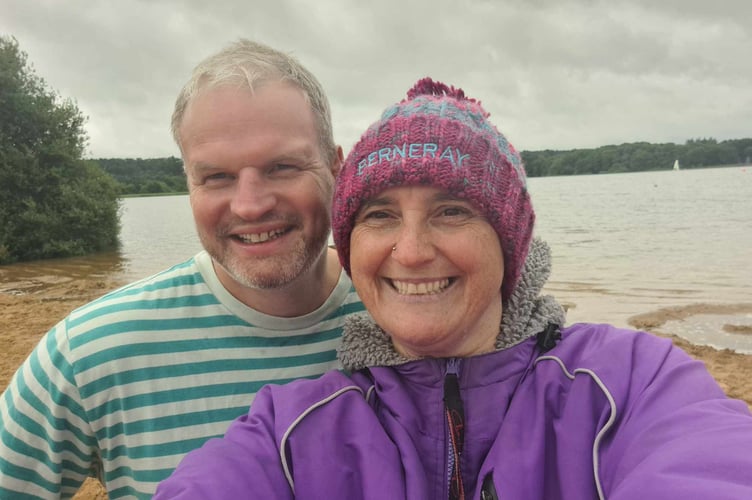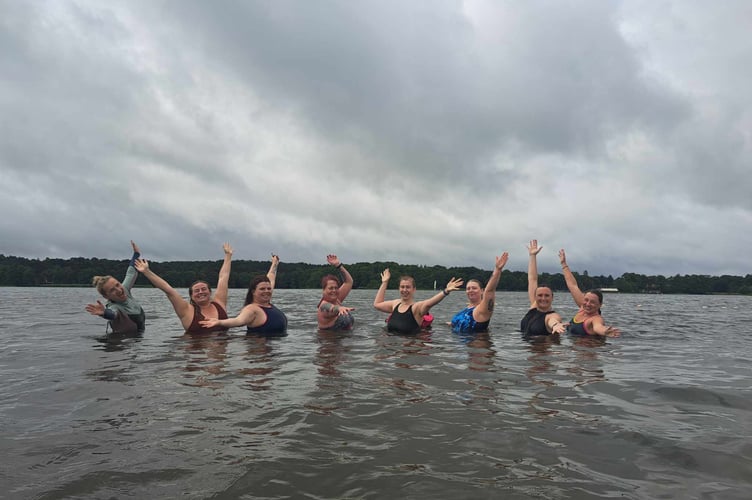The walk to the pond is short; the sand quickly gives way to silt, cold water rising to my thighs, then my stomach. I dive before it can reach my chest, water cracking over my head like an egg fresh from the fridge. And just like that, I’m in.
It’s quiet under the water. It muffles the ducks’ quacks as they fly overhead and the kids’ laughter as they splash each other just a step from the beach, their parents watching from picnic blankets spread across the sand. It’s quiet in my head, too.
I surface, sounds rushing back in, take another deep breath, then I’m under again. The water cradles me as I lie weightless in its arms.
It was my sister’s idea to start cold water swimming. She was desperate to get me out of the house after I was diagnosed with depression and anxiety. My mental health had taken a serious tumble after many years of battling a chronic health condition. Together we dusted off our swimsuits, grabbed a towel, and layers – many layers – and headed to Frensham Ponds.

It was February, and the water was freezing. Our first ‘swim’ was less a swim, more a plunge. We were the only people there, the summer crowds all tucked up at home with hot chocolates and blankets. But my sister and I braved the pond, each of us telling the other that we could do it. And we did; after a desperate dunk, some very loud shrieks, and a quick retreat.
As we dried our goose-pimpled skin, laughing, I knew I would be coming back. To start with, I dragged friends and family with me, but as the months passed, I found myself going alone.
Now I park up, leave my phone in the car, take just a towel, and slip between the sunbathers into the water. It has become the only place I am fully present – just me and the water. Addiction to phones, social media, and everything else screen-based is often synonymous with depression.
It’s true that I struggle to be alone with my thoughts, but when I go swimming, I have no choice. This forced screen-silence has become a lifeline I didn’t even know I needed.
Another lifeline many people struggling with their mental health have found, myself included, is Mental Health Swims.
Mental Health Swims is a nationwide mental health support community that organises free regular swimming sessions. Frensham Mental Health Swims launched in February 2023 when Jamie Richardson took up the mantle of co-host.
“I had just gone through a divorce and, let’s just say, my mental health was a bit squiffy,” said Jamie. “A friend told me about Mental Health Swims, and I signed up, and here we are. The group has been a saviour for me; it’s given me a community.
“I think my life would look very different if I hadn’t started this. I would probably be in a pretty dark place. With mental health struggles, you don’t have a black eye or a broken leg; you can look completely fine and still be really struggling.”
Jamie is a co-host at Frensham with Katy White and Caroline Scarles. Caroline has struggled with anxiety since she was a teenager. For her, swimming is a space to escape.

She added: “It is a space to release yourself from the pressures and strains, not just from society, but importantly, the pressures we put on ourselves. There is something about when you go into the water, it holds you. It washes away all the stuff going on in your head.
“The group is a completely safe space. I don’t care where you live, what your house is like, it’s a space for people to come as they are – their true selves – a completely non-judgemental space.”
There are a variety of sessions for people to join, from early-morning dips to after-work swims to Relax & Flow.
Sitting in a wide circle on the beach at a Relax & Flow session, every person introduced themselves and shared something on their mind. It is all completely confidential, and there is no pressure to share anything, but it is a space of no judgement where others may be going through similar struggles. Every time I have gone, I have been surprised by how much I want to share and how freeing it feels.
As someone with depression and anxiety, it can be hard when someone asks you how you are. Do you lie? Mask the pain you feel and say, “I’m fine, how are you?”
Or do you tell the truth? Do people even want to hear the truth?
At Mental Health Swims, you don’t need to lie, nor do you need to share if you don’t feel able to, but if you do, then people do want to hear the truth. There is no shame in saying you’re not fine.
As we sat, most of us strangers to each other, the heavens opened, and rain peppered our skin. Caroline led us through some breaths before we all entered the water together. There is something truly special about sharing this experience with a group, all there to support one another.
Afterwards, hot chocolates and cakes were devoured, and some people at the session chose to share what the group means to them.
One woman has suffered from mental health issues all her life but was only diagnosed with complex PTSD very late in life.
“After my last suicide attempt, I found this group,” she said. “I only feel like I’m fully alive when I am in the water, with this group. Otherwise, I feel like half a person. But here, any pretence just falls away.
“It has massively helped me. I think it is so important to have something free and not on the NHS, with no waitlists. It feels great to have something for me.”

Another woman added: “Sometimes you need to share, sometimes you just need to listen, and even if you come on a good mental health day, it can help take the burden off someone else. It is judgement-free mental health; you don’t have to just say you’re fine, and that’s ok.
“It is choosing to lean into people instead of away, and not hide under the duvet like you might want to.”
More research is being conducted to understand the link between cold water swimming and improving mental health. One well-documented example is the mammalian diving reflex – being submerged in cold water while holding your breath can trigger a decrease in heart rate and a redistribution of blood flow – in other words, taking a dip can literally calm you down.
Co-host Jamie is hoping that soon GPs will be able to refer people to the group as part of their treatment plans.
The walk to the pond is short, but sometimes those few steps can feel like a marathon. But you look to your left, to your right; there is laughter and gasps. Cold water laps against many shins, many thighs, and when you break the surface and blink the water from your lashes, you know you are not alone.
To check out Frensham Mental Health Swims, head to: https://tinyurl.com/dipsnotdistance






